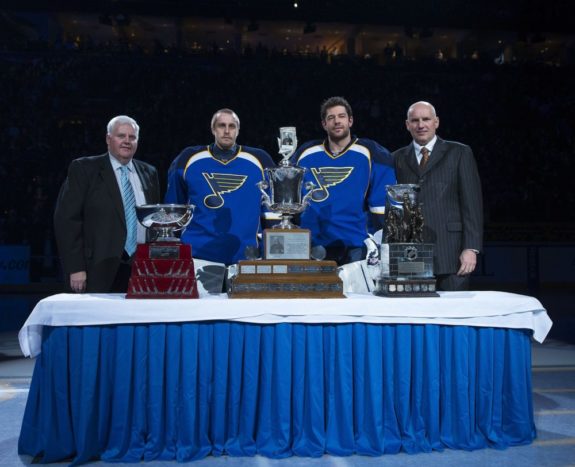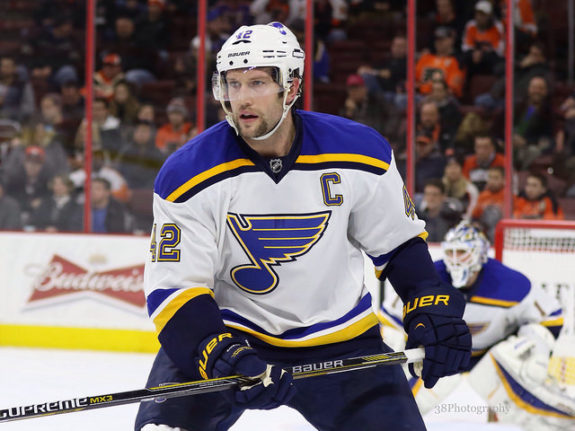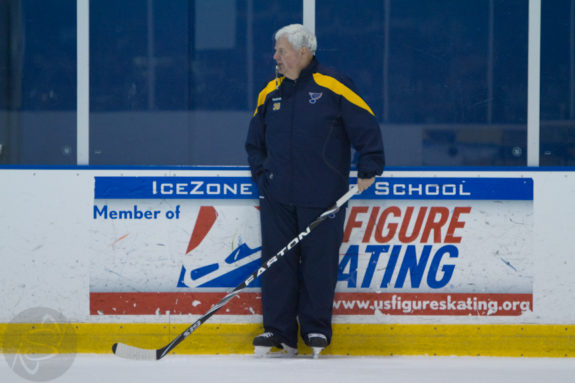It has certainly been a ride for Ken Hitchcock and the St. Louis Blues.
For the better part of four seasons, Hitchcock has been the man behind the home bench at Scottrade Center. In that time, the Blues have boasted a 175-79-27 record, which includes two finishes atop the Central Division and two times finishing second in the division. He has won a Jack Adams Trophy as coach of the year (2011-12), while seeing goaltenders Jaroslav Halak and Brian Elliott win the William M. Jennings Trophy in the same season. Even Hitchcock’s boss, Doug Armstrong, won General Manager of the Year in 2012.

However, all of that success has been torn down with three consecutive first-round losses, as well as a second-round sweep against in 2012. Needless to say, the Blues’ success has not continued past early April.
It’s called a lot into question for the fourth winningest coach in NHL history. Despite the regular season accolades, Hitchcock has been the face of scrutiny by fans for some time.
He shuffles lines. He plays favorites. He doesn’t have a clue about goaltending. — These are just some of the complaints you will see on message boards across the interweb.
Is it justified? There are certain factors to consider that weigh in both Hitchcock’s and critics’ favor.
Reason for success
Yes, the aforementioned prosperity has all come during the regular season, but let’s not forget the state of the team before Hitchcock’s arrival.
From 2005-06 to 2011-12, the Blues had mustered just one playoff appearance (2009), along with zilch in the playoff wins category. The team’s core forwards, David Backes, T.J. Oshie and David Perron, almost seemed stagnant in their production. Goaltender Jaroslav Halak was pretty good, but not dominant the way he was in Montreal.
Enter Hitchcock.
The Blues, who began the 2011-12 season with a 6-7-0 record, finished the season with a 43-15-11 record under Hitchcock, thrusting themselves to the Central Division title for the first time since 2000.
Hitchcock truly received the best out of his new lineup. Backes cemented himself as a top-notch defensive forward, finishing as the runner-up for the Selke Trophy as the League’s best defensive forward. Oshie (54) and defensive Alex Pietrangelo (51) scored their first 50-point seasons. Perron scored a career-high 21 goals, despite only appearing in 57 games. Of course, the goaltending was superb as Halak and backup Brian Elliott combined for 15 shutouts.

After losing to the Los Angeles Kings in the second round, the Blues found similar success in the lockout-shortened 2012-13 season. They added Jay Bouwmeester to the mix, yet fell to the Kings again, this time in the first round.
Regular season success, new players added, same result in 2013-14 (first-round loss to the Chicago Blackhawks). Lather, rinse, repeat for the 2014-15 season (out after a six-game loss to the Minnesota Wild in the first round).
The Blues took a step forward with his guidance. However, it seems the roster has reached a stagnant level yet again.
Point fingers
Blaming the coach for this current roster’s shortcomings has run thin. Yes, there are only nine players remaining from when Hitchcock first took over, and only five remaining from when Davis Payne was named the bench boss in January 2010, but those players serve as the team’s leadership group.
At some point, the long-tenured players (Backes, Oshie, Pietrangelo, Patrik Berglund, Barret Jackman and Alexander Steen) need to be the ones held accountable. It seems a culture change in the team’s locker room has been needed for some time.
For more on changes needing to take place amongst player personnel, read Part I of this series.
Clean house under Hitchcock
Maybe the line shuffling has created a problem with the team chemistry. Maybe going with Jake Allen for Game 6 of this year’s first-round exit was not the correct move. However, Hitchcock is not the only one making these critical decisions. He receives intel from his coaching staff.
Usually when a coach is hired, he is allowed to hire his own staff and release the former coach’s regime. That’s not the case in St. Louis.
Maybe Hitchcock prefers the staff he was provided. However, that would also propose the idea that former coach Payne was accepting of his staff, as well.
Assistant coaches Ray Bennett and Brad Shaw have stood the test of time against three St. Louis coaches (including Hitchcock). Bennett was hired two days after Andy Murray took over on December 11, 2006, while Shaw joined the Blues the following summer. When Murray was relieved of his duties in January 2010, Bennett and Shaw continued their employment. It was the same case when Payne was fired midseason in November 2011.
Bennett, who focuses largely on video analysis, has had his power-play duties relinquished and reclaimed multiple times in his tenure. In his time, the power-play units have finished as high as fourth, while falling to as low as 30th.
Shaw, a former NHL defenseman, coaches the defensive side of the ice. While the Blues always seem to finish among the top teams in terms of goals and shots against, the unofficial scoring chances seem to pile up during stretches.
A perfect example came in the form of multiple goals against in the Blues’ 6-5 shootout loss to the Vancouver Canucks on March 1.
https://youtu.be/X5BK-zKts74
Only Jackman remains on the blue line from Shaw’s first season with St. Louis. Not only has Shaw coached through multiple disappointing seasons and numerous early playoff exits, he has received a promotion in that time (named an associate coach on June 15, 2012).
Assistant coach Kirk Muller, goaltending coach Jim Corsi and video coach Sean Ferrell were all named to the staff last summer. It may still be too early to pull the trigger on these newcomers.
The seasoned bench leadership, though, has been awarded too many second chances.
Hitchcock’s future

“I need time,” Hitchcock told reporters in his post-season press conference. “I need time to reflect, some time to evaluate right now, what I’ve done, what I’ve accomplished, what’s happened to us, both positive, a lot of it, and the negative, which goes with the territory. I feel like I’ve let people down right now and I need to look at that and what needs to improve and I want time and space to evaluate it. I’ll sit down with Doug (Armstrong), we’ve been together a long time, I know how good a coach I am, I know what I can do.”
Much to the liking of numerous Blues fans, those could be the parting words for the storied coach in St. Louis. This monologue perfectly sets up a scenario where Hitchcock decides to retire, or for Armstrong to force a retirement from the man he has stood by countless times to the media.
If Hitchcock does not return in 2015-16, chances are likely that Muller, the former head coach of the Carolina Hurricanes, will receive a long look from management as the next team’s head coach. He was hired in large part to turn around a lackluster Blues power play; the team converted on a measly 6.9 percent of their chances in the 2014 playoffs before converting on an outstanding 18.2 percent in 2015. He has the experience for the job and garners respect from the roster for his accomplishments both as a former player and a coach.
As for Hitchcock, it would be a dreary end to a career that saw a 53.6 regular season winning percentage and a Stanley Cup championship (1999). He coached the Blues to a 175-79-27 regular season record, to go along with back-to-back seasons of 111 and 109 points.
If Hitchcock is not behind the Blues’ bench next season, though, the onus for success will shift to another position within the organization. This time, everyone above, and below, the head coach will face the wrath of an ownership that is desperately seeking a Stanley Cup title.
The ride will come to a screeching halt if past failures continue.
Read the other parts of this series.
Part I: On-Ice Leadership
Part II: Coaching
Part III: General Manager